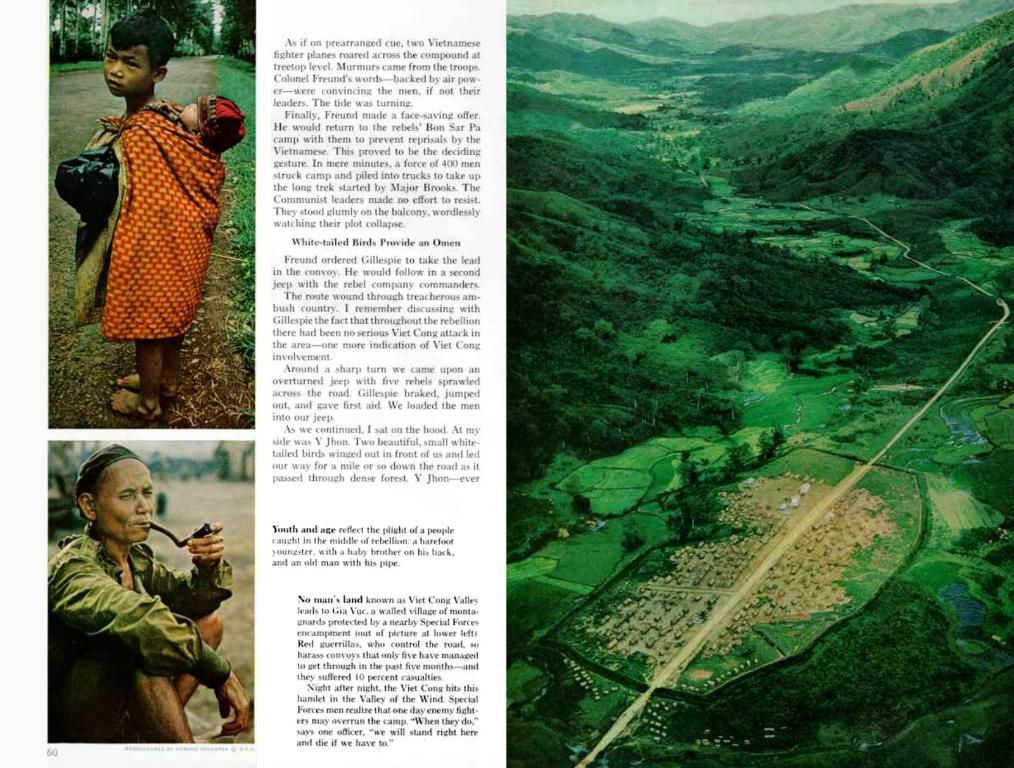Raging Forest Fires Tear Through Canada: Over 33,000 Forced to Flee Homes
Massive Forest Fires Ravage Canada, Forcing Over 31,000 Residents to Evacuate - Massive wildfires in Canada: Over 31,000 residents evacuated from their homes
The provinces of Saskatchewan and Manitoba, beating at the heart of the continent, are currently grappling with an onslaught of devastating forest fires. As these infernos rage on, a state of emergency has been in effect for days, leaving thousands of residents frantic and fearful.
"It's just nuts, mate," shares Tareq Hosen Alin, the owner of a hotel in La Ronge, Saskatchewan, who, despite the town's evacuation, has made the choice to remain, catering to the tireless legion of firefighters and emergency personnel on the frontlines.
La Ronge's fire department echoed Alin's sentiments in a shocking statement on Wednesday, "The past few hours have been absolute bedlam." Numerous active fires encircle the city, among these, one wildfire already responsible for the annihilation of over 479,000 hectares of land, refusing to yield.
The catastrophic effects of these fires have already spread across central Canada and northern sections of the U.S., leading to deteriorating air quality and degrading visibility in several regions.
The cause of most of these fires? Human negligence—from abandoned campfires to recklessly discarded cigarettes. However, experts unanimously point to man-made climate change, which continues to amplify the likelihood of brutal forest fires in Canada, as the root of the mounting disaster.
In 2023, the country wrestled with its worst forest fire season to date, with over 15 million hectares of land consumed, eight firefighters lost, and 230,000 people uprooted from their homes.
- Canada
- Forest Fire
- Climate Change
- Evacuation
- Firefighter
- Saskatchewan
- Manitoba
When Human Error and Climate Change Collide
- Droughts: Persistent droughts have rendered vegetation tinder-dry, leading to its easy ignition and swift flare-ups.
- Summer Heatwaves: Heatwaves, triggered by advancing climate change, have combined with droughts to foment a perfect storm for uncontrollable wildfires.
- Wind: Gale-force winds drive the fires, churning them into unimaginable fury that consumes everything in their path.
Scorched Earth, Scarred Spirits, and a Grim Reality
- Economic and Environmental Impact: The fires have devastated local economies and ecosystems, compromising the livelihoods and habitats of countless residents.
- Fatalities: A grim count of casualties has been recorded, including two lives lost in Manitoba.
- Smoke Dispersal: Smoke from the infernos has reached as far as the U.S. and Europe, wreaking havoc on air quality and visibility.
- Evacuations: The displacement of over 33,000 people, with thousands more in dire need of aid, has left communities shaken and on the brink of collapse.
A Call to Arms: United in Preparedness, United in Recovery
- Control and Monitoring: Establishing advanced monitoring systems to anticipate, detect, and efficiently prevent fires from spreading.
- Prescribed Burns: Carefully orchestrated controlled burns can reduce fuel loads and mitigate the risks of larger wildfires.
- Public Education: Implementing public awareness initiatives to promote responsible fire safety practices, reducing human-caused ignitions.
- Collaboration and Support: Fostering international cooperation and collaboration, as evidenced by U.S. assistance, to share resources, expertise, and provide mutual aid during crises.
- Climate Change Mitigation: Adopting and implementing strategies that consider the projected impacts of climate change on the future of forest fires, enhancing preparedness and response capabilities.
Taking Action: The Power to Adapt and Triumph
- U.S. Aid: The U.S. has provided reinforcements, from airtankers to over 150 firefighters, to aid in the daunting efforts of containment.
- Emergency Measures: With both Manitoba and Saskatchewan declaring states of emergency, the crisis now demands concerted and expeditious responses.
- Military Support: The Canadian armed forces have stepped up to provide evacuation assistance and bolster the ranks of firefighting personnel.
- Canada's forest fires have been exacerbated by climate change, leading to larger fires and more evacuations, as seen in the current crisis in Saskatwan and Manitoba where over 33,000 people have been forced to flee their homes.
- Scientists studying environmental-science have identified a relationship between man-made climate-change and the increased occurrence of forest fires, noting factors such as droughts, summer heatwaves, and strong winds.
- As the world grapples with the reality of climate change, the political response to this issue has gained prominence in general-news, with a focus on mitigation strategies, public education, and international cooperation to address the growing threat of forest fires.








